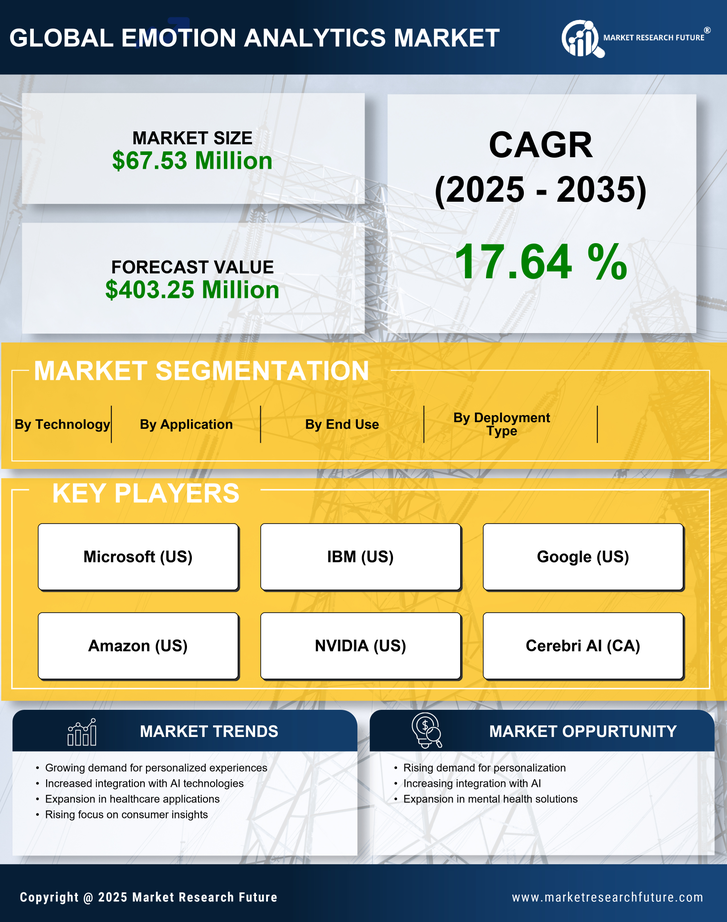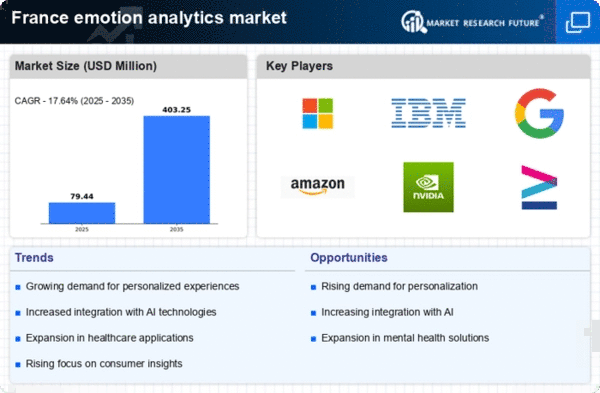Rising Demand for Personalized Marketing
The emotion analytics market in France is experiencing a notable surge in demand for personalized marketing strategies. Businesses are increasingly recognizing the value of tailoring their offerings to individual consumer emotions and preferences. This shift is driven by the need to enhance customer engagement and loyalty. According to recent studies, companies utilizing emotion analytics can improve their marketing effectiveness by up to 30%. As brands strive to create more meaningful connections with their audiences, the integration of emotion analytics tools becomes essential. This trend is likely to continue, as organizations seek to leverage emotional insights to refine their marketing campaigns and drive sales growth.
Growing Importance of Employee Well-being
The focus on employee well-being is becoming a critical driver for the emotion analytics market. Organizations are increasingly aware that understanding employee emotions can lead to improved workplace satisfaction and productivity. By utilizing emotion analytics tools, companies can gauge employee sentiments and address potential issues proactively. This trend is reflected in the growing investment in employee engagement platforms, which are projected to reach €1 billion by 2026. As businesses prioritize mental health and emotional intelligence, the demand for emotion analytics solutions tailored to the workplace is likely to expand, enhancing overall organizational performance.
Advancements in Data Processing Technologies
Technological advancements in data processing are significantly influencing the emotion analytics market. The emergence of sophisticated algorithms and machine learning techniques enables businesses to analyze vast amounts of emotional data with greater accuracy and speed. This capability allows for real-time insights into consumer behavior, which is crucial for making informed decisions. The market is projected to grow at a CAGR of 25% over the next five years, driven by these innovations. As companies increasingly adopt these technologies, the demand for emotion analytics solutions is expected to rise, facilitating deeper understanding of customer sentiments and preferences.
Expansion of E-commerce and Digital Platforms
The expansion of e-commerce and digital platforms is driving growth in the emotion analytics market. As online shopping becomes more prevalent, businesses are seeking ways to enhance the customer experience through emotional insights. Emotion analytics tools enable companies to understand consumer emotions during the online shopping journey, allowing for tailored recommendations and improved customer satisfaction. The e-commerce sector in France is projected to reach €100 billion by 2025, highlighting the potential for emotion analytics to play a pivotal role in shaping online consumer interactions. This trend suggests a growing reliance on emotional data to optimize digital marketing strategies.
Regulatory Compliance and Ethical Considerations
Regulatory compliance and ethical considerations are emerging as significant factors influencing the emotion analytics market. With the implementation of stringent data protection laws, companies must navigate the complexities of collecting and analyzing emotional data responsibly. This environment necessitates the development of transparent and ethical emotion analytics practices. Organizations that prioritize compliance are likely to gain a competitive edge, as consumers increasingly favor brands that demonstrate a commitment to ethical data usage. The market is expected to adapt to these regulatory changes, fostering innovation in privacy-preserving emotion analytics solutions.

















